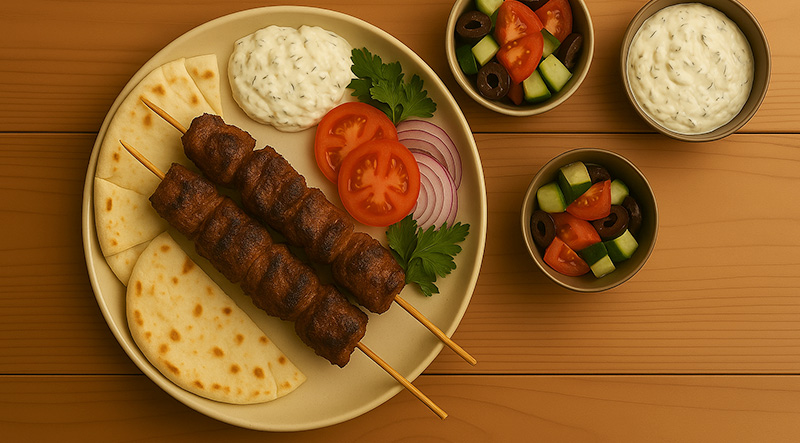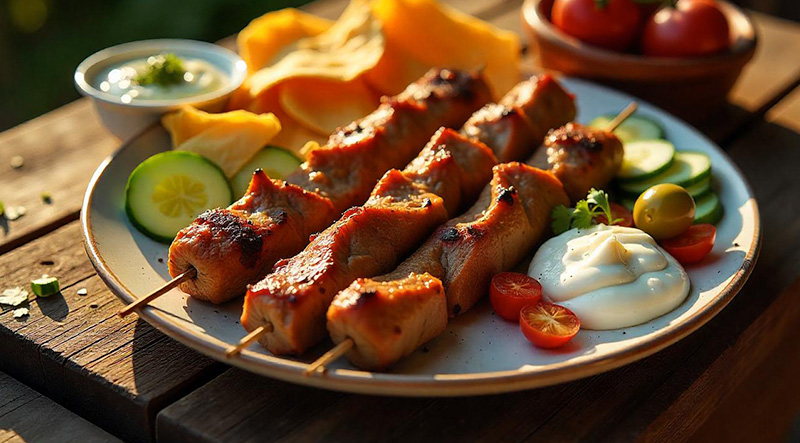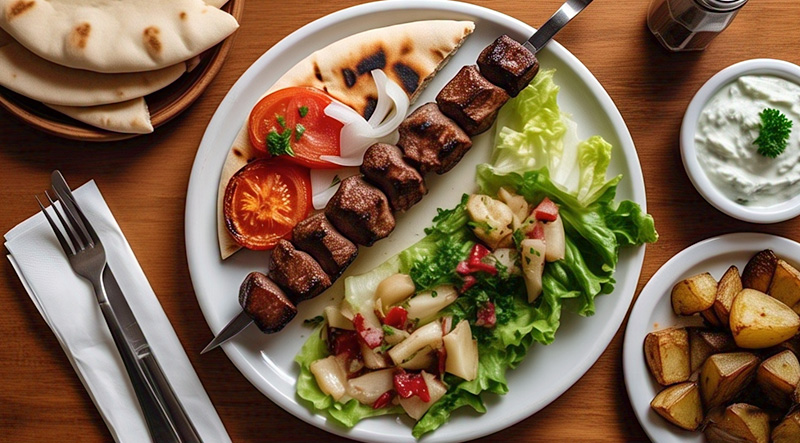Souvla, Cyprus' beloved national dish, is a true embodiment of Mediterranean flavor. Picture succulent chunks of marinated lamb, pork, or chicken, expertly skewered and slowly roasted over an open flame, developing a smoky, charred perfection. With each bite, the meat is tender and bursting with savory goodness, complemented by classic sides like warm pita, creamy tzatziki, and a vibrant Greek salad. Served with crispy fries, souvla is more than a meal—it’s an irresistible invitation to savor the rich culinary traditions of Cyprus in every mouthwatering bite. Read More...
The History of Souvla – Cyprus’ Beloved National Dish:
Souvla, a dish synonymous with Cypriot tradition and celebration, holds a special place in the hearts and homes of the island’s people. From village gatherings to family feasts and festive occasions, souvla is the star of the Mediterranean table, showcasing the flavors and customs of Cyprus in every bite. This dish, simple in its preparation yet rich in flavor, has a history that reflects the island’s diverse cultural influences and deep connection to the land.
Origins and Early Beginnings:
The origins of souvla can be traced back to ancient Cyprus, though its precise origins remain somewhat unclear. The term “souvla” refers to the large skewers traditionally used to cook the meat, and the method of cooking—grilling meat over an open flame—has been practiced in the region for centuries. The concept of roasting meat on skewers can be linked to early Mediterranean cooking methods, a technique influenced by ancient Greek and Middle Eastern traditions. Cyprus, being a crossroads of various civilizations throughout history, has long embraced these techniques, adapting them to its own tastes and ingredients.
Historically, souvla was a dish enjoyed by farmers and herders, who would often prepare it during communal gatherings, celebrations, and religious festivals. The slow-cooking method over open flames not only provided a way to cook large quantities of meat for gatherings but also imparted a distinct smoky flavor that became a hallmark of Cypriot cuisine.
The Influence of Ottoman and Greek Traditions:
Cyprus’ long history of foreign rule and cultural exchange played a significant role in shaping its culinary identity. The Ottoman Empire, which controlled the island for centuries, introduced many culinary techniques and spices that are now staples in Cypriot cooking. The use of aromatic herbs, olive oil, and grilled meats reflects the influence of Turkish cuisine, which has left its mark on many traditional Cypriot dishes.
Similarly, the island’s strong Greek influence is evident in the side dishes that accompany souvla. Items like tzatziki (a yogurt-based cucumber dip), Greek salad, and pita bread are integral components of the souvla experience. These dishes, rich in vegetables, yogurt, and olive oil, complement the grilled meat perfectly, balancing the rich, smoky flavors of the souvla.
Souvla as a Symbol of Cypriot Hospitality:
Throughout Cypriot history, food has been a key element in fostering a sense of community and connection. Souvla, in particular, is a dish meant for sharing. Whether it’s a Sunday family gathering, a wedding, or a public holiday like Easter, souvla plays a central role in bringing people together. The act of preparing souvla—grilling meat on a large skewer over an open flame—requires patience and cooperation, making it a communal affair that reflects the island’s emphasis on hospitality and togetherness.
The tradition of grilling souvla has evolved over time, with modern barbecues and spit-roast techniques making it easier to prepare, but the essence of the dish remains the same. The key to an authentic souvla lies in the careful seasoning and slow cooking, allowing the meat to absorb the rich flavors of the marinade and smoke.
Souvla in Modern Cyprus:
Today, souvla remains an enduring symbol of Cyprus’ culinary heritage, beloved by locals and visitors alike. In modern times, souvla is often prepared for family celebrations, especially during Easter, when it is traditionally served as part of a larger feast. It is also a popular dish at restaurants and tavernas across the island, where diners can enjoy expertly grilled souvla served alongside traditional Cypriot sides like olives, halloumi cheese, and fresh vegetables.
While the classic version of souvla typically features lamb, pork, or chicken, variations of the dish have emerged over time, with some chefs incorporating different meats, such as beef or even fish, into the mix. The key to great souvla remains the same: high-quality meat, an aromatic marinade, and slow cooking over an open flame.
Conclusion:
Souvla is much more than just a meal—it is a culinary tradition that binds the people of Cyprus to their history, culture, and each other. From its ancient roots to its modern-day popularity, souvla has remained a timeless dish that reflects the Mediterranean values of sharing, celebration, and community. Whether enjoyed at a family gathering or served in a lively taverna, souvla continues to be the heart of Cypriot hospitality, a dish that brings people together and offers a taste of the island’s rich cultural heritage with every mouthwatering bite.
Prepare the Marinade
Prepare the Grill

Grill the Souvla:

Check for Doneness

Serve:

Tips for the Perfect Souvla:
Enjoy your Souvla, Cyprus’ national dish—perfectly grilled, rich in flavor, and ideal for sharing with family and friends!
The preparation time for Souvla is approximately 15-20 minutes, including marinating the meat and preparing the sides. The meat should be marinated for at least 2-4 hours, preferably overnight for maximum flavor. Cooking the souvla on the grill takes about 1.5 to 2 hours for lamb or pork, and about 45 minutes to 1 hour for chicken, depending on the heat and the size of the meat. Overall, you’ll need about 2 to 3 hours from start to finish, with much of the time spent marinating and grilling, making it perfect for a relaxed, flavorful meal.
A single serving of Souvla, based on the recipe provided, contains approximately 400-600 calories. This estimate includes the grilled meat (lamb, pork, or chicken), seasoned with olive oil, garlic, and spices, served with traditional sides like pita bread, tzatziki, Greek salad, and fries. The exact calorie count may vary depending on the portion sizes, type of meat, and the specific ingredients used, such as the amount of olive oil and fries. The balance of protein, healthy fats from olive oil, and carbohydrates from the sides makes it a satisfying and hearty meal.







